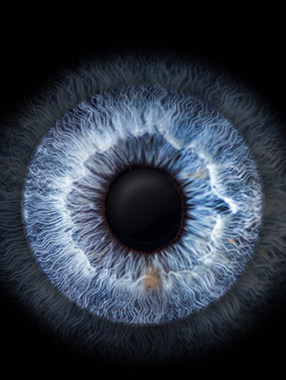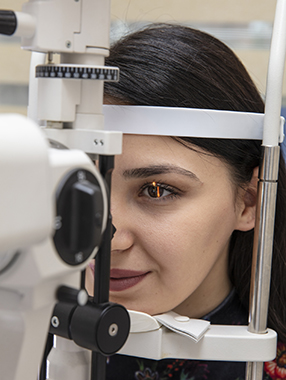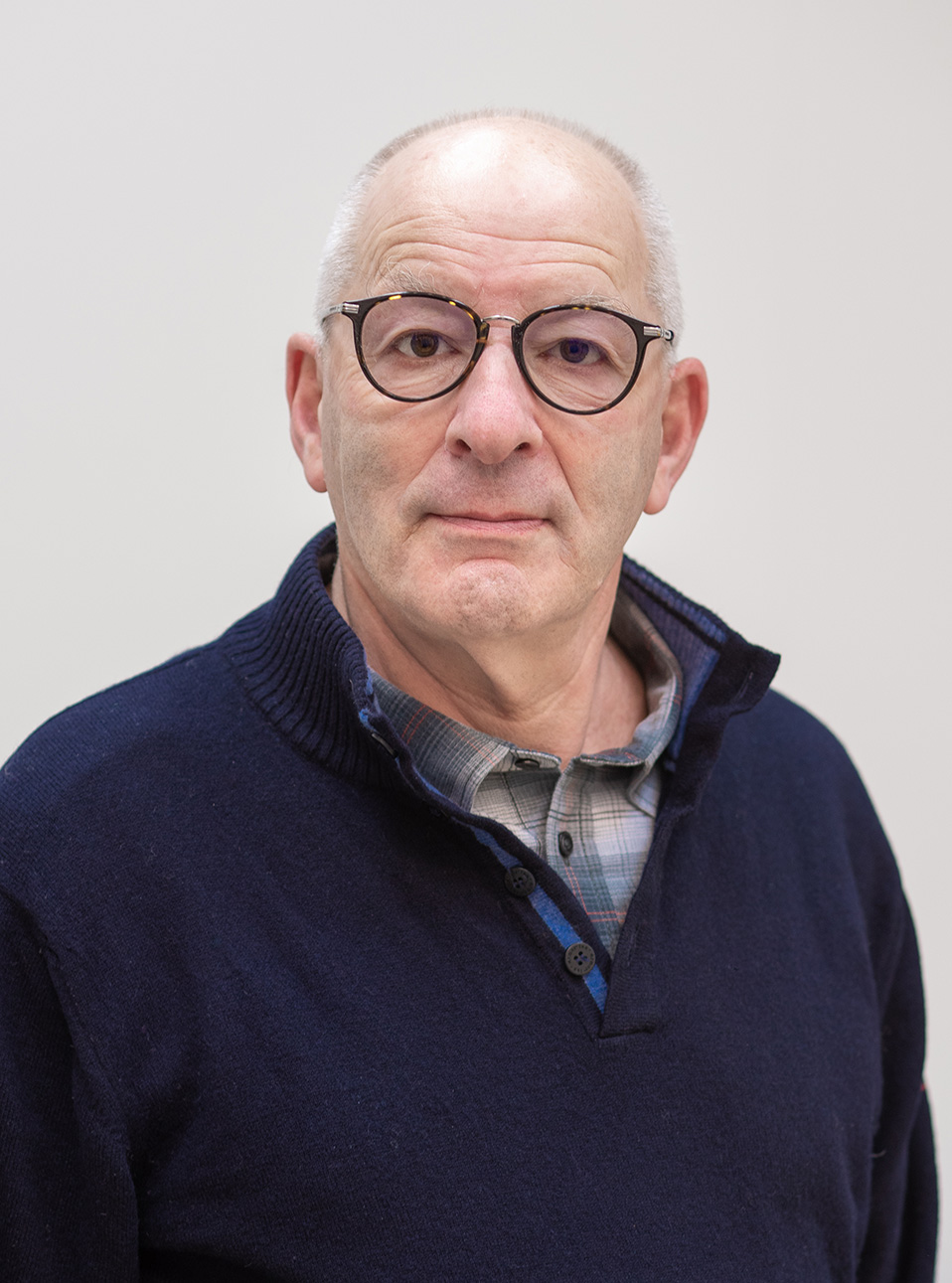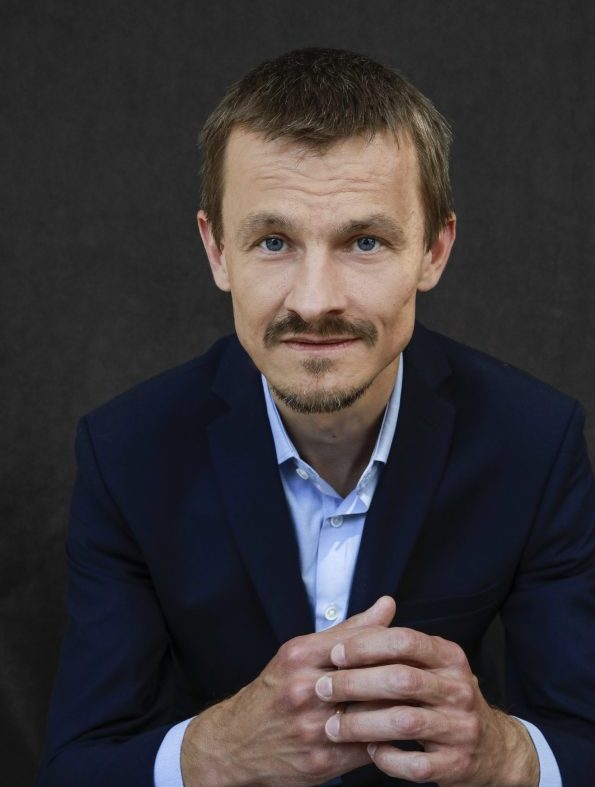Former Director of Scientific Research CNRS in Besançon, France.
Technological expertise: novel MOEMS architectures for sensing with the development of miniature parallel on-chip microscopes, experience in transferring IP to industrial companies.
Served as National Secretary of the French Society of Optics (SFO).
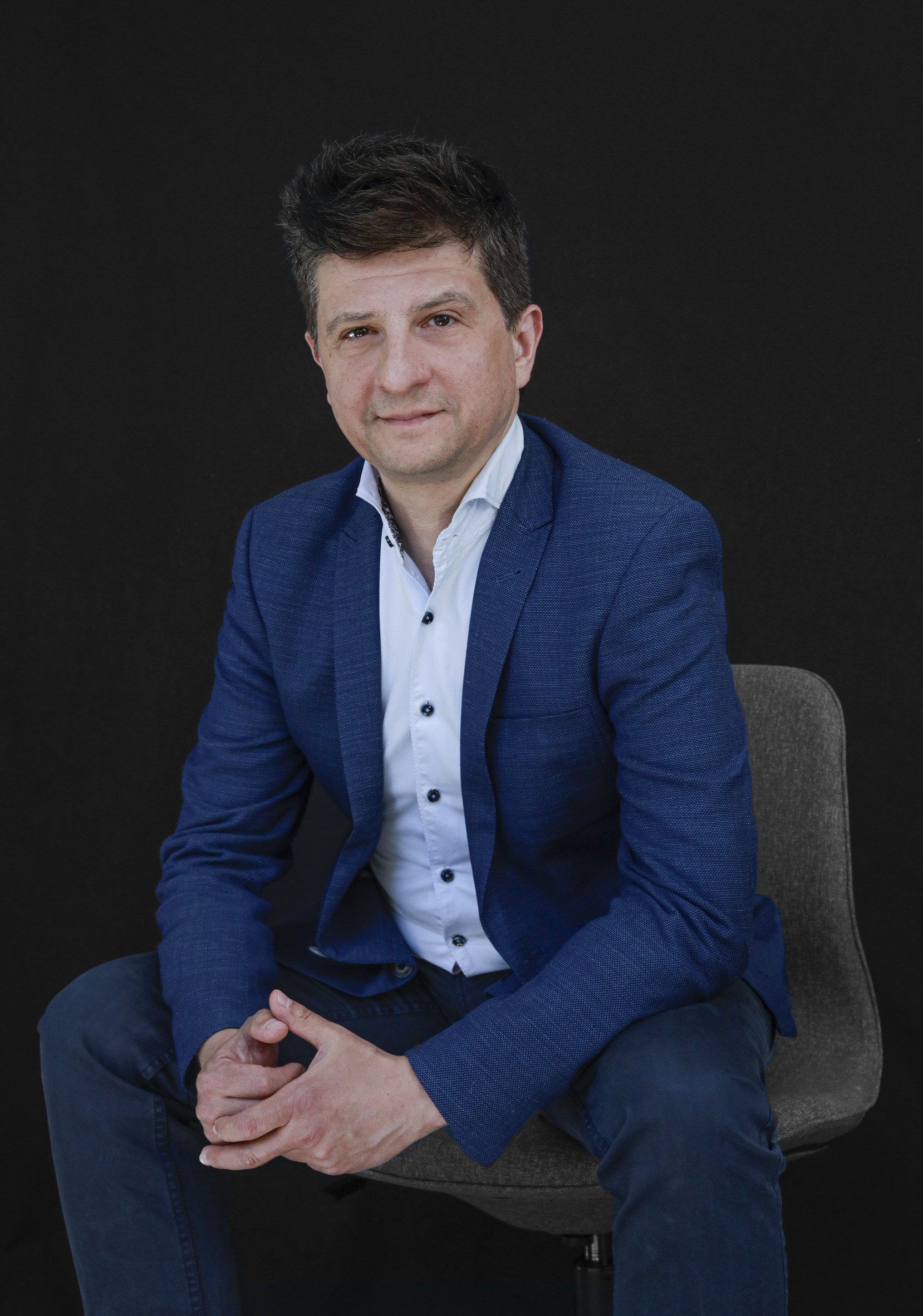

Prof. dr hab. Maciej Wojtkowski
Professor of Physics (2003), habilitation in Physics (2010) at the Faculty of Physics and Astronomy of Nicolaus Copernicus University in Toruń, Poland
ICTER's Chair and POB Group Leader
Biomedical Imaging
Prof. dr hab. Maciej Wojtkowski (born 1975) is a physicist specializing in applied optics and medical and experimental physics. He started his scientific career at the Nicolaus Copernicus University in Toruń. There he defended his master’s thesis, and then his doctoral thesis and postdoctoral thesis (habilitation). All degrees were awarded by the Institute of Physics, Faculty of Physics, Astronomy and Computer Science. From 1998 to 1999 he was employed as a researcher at the University of Vienna, Austria, and from 2003 to 2005 at the Massachusetts Institute of Technology in Cambridge and Tufts New England Eye Center, Boston, USA.
Prof. Wojtkowski is the inventor of the first prototype clinical SdOCT device for eye imaging, built at the Massachusetts Institute of Technology and tested at the New England Eye Center in Boston USA, and the second built at the Nicolaus Copernicus University in Toruń and tested at the Jurasz Ophthalmology Clinic in Bydgoszcz.[1][2][3] This device is used for non-invasive, non-contact eye examinations in clinics all over the world to monitor the onset, progression, and therapy of eye diseases.
Since 2016, Prof. Wojtkowski has headed the Department of Physical Chemistry of Biological Systems, and since 2019 the International Centre for Translational Eye Research – both institutions are subunits of the Institute of Physical Chemistry of the Polish Academy of Sciences.
He has authored more than 240 scientific publications, as well as several patents and patent applications. His work has been published in the following leading journals, among others: “Ophthalmology”, “Proceedings of the National Academy of Sciences”, “Nature Medicine”, “Optics Express”, “Journal of Biomedical Optics” and “Optics Letters”. He was the first to design a spectral optical coherence tomograph used for non-invasive, non-contact eye examinations. This invention has found a wide application and is used in clinics all over the world. In 2012 he was honored with the prestigious Foundation for Polish Science (FNP) Award in Mathematical and Physical Sciences and Engineering.
Scholarly books:
- M. Wojtkowski „Obrazowanie za pomocą tomografii optycznej OCT z detekcją fourierowską”, (rozprawa habilitacyjna), wydawnictwo naukowe Uniwersytetu Mikołaja Kopernika w Toruniu, 2009.
Scholarly book chapters:
- D. Huang, O.Tan, J.G.Fujimoto, W.Drexler, J.F. deBoer, M.Wojtkowski, A.Kowalczyk – Optical Coherence Tomography in: Retinal Imaging, Editors: D.Huang, P.K.Kaiser, C.Y.Lowder, E.I.Traboulsi., Elsevier, Philadelphia 2006 Pages 47-65
- R. Leitgeb and M. Wojtkowski – Complex and Coherence Noise Free Fourier domain Optical Coherence Tomography in “Optical Coherence Tomography, Technology and Applications”, Editors: Wolfgang Drexler, James G. Fujimoto Eds., Springer-Verlag, Berlin Heidelberg 2008, Pages 177-209
- R. A. Leitgeb, M. Wojtkowski, Complex and Coherence-Noise Free Fourier Domain Optical Coherence Tomography” in “Optical Coherence Tomography, Technology and Applications” second edition, Editors: Wolfgang Drexler, James G. Fujimoto, Springer International Publishing, Switzerland 2015 , Pages 195-224, ISBN: 978-3-319-06418-5
- R. A. Leitgeb, M. Szkulmowski, C. Blatter, M. Wojtkowski, “Doppler Fourier Domain Optical Coherence Tomography for Label-Free Tissue Angiography” in “Optical Coherence Tomography, Technology and Applications” second edition, Editors: Wolfgang Drexler, James G. Fujimoto, Springer International Publishing, Switzerland 2015, Pages 1321-1352, ISBN: 978-3-319-06418-5
- M. Wojtkowski, S. Marcos, S. Ortiz, I. Grulkowski “Application of Fourier Domain OCT Imaging Technology to the Anterior Segment of the Human Eye” in “Optical Coherence Tomography, Technology and Applications” second edition, Editors: Wolfgang Drexler, James G. Fujimoto, Springer International Publishing, Switzerland 2015, Pages 1617-1648, ISBN: 978-3-319-06418-5
- S. Marcos, C. Dorronsoro, K. Karnowski, M. Wojtkowski “OCT with air-puff stimulus” in “Corneal Biomechanics, Editors: Cynthia J. Roberts, Jun Liu, Kugler Publications, Amsterdam 2016, Pages 111-132, ISBN: 978-90-6299-248-5
Peer-reviewed journal articles:
- G. Palczewska, M. Wojtkowski, K. Palczewski, From mouse to human: Accessing the biochemistry of vision in vivo by two-photon excitation, Progress in Retinal and Eye Research, Volume 93, 101170, 2023
- Bogusławski J, Tomczewski S, Dąbrowski M, Komar K, Milkiewicz J, Palczewska G, Palczewski K, Wojtkowski M. In vivo imaging of the human retina using a two-photon excited fluorescence ophthalmoscope. STAR Protoc. 2023 Apr 13;4(2):102225. doi: 10.1016/j.xpro.2023.102225. Epub ahead of print. PMID: 37058404.
- Auksorius, E., Borycki, D., Wegrzyn, P., Sikorski, B.L., Lizewski, K., Zickiene, I., Rapolu, M., Adomavicius, K., Tomczewski, S., and Wojtkowski, M. Spatio-Temporal Optical Coherence Tomography provides full thickness imaging of the chorioretinal complex. iScience, 25, 12, 105513, (2022)
- B. E. Bouma, J. F. de Boer, D. Huang, I.-K. Jang, T. Yonetsu, C. L. Leggett, R. Leitgeb, D. D. Sampson, M. Suter, B. J. Vakoc, M. Villiger, and M. Wojtkowski, „Optical coherence tomography,” Nature Reviews Methods Primers 2, 79 (2022).
- S. Ananthaseshan, K. Bojakowski, M. Sacharczuk, P. Poznanski, D. S. Skiba, L. Prahl Wittberg, J. McKenzie, A. Szkulmowska, N. Berg, P. Andziak, H. Menkens, M. Wojtkowski, D. Religa, F. Lundell, T. Guzik, Z. Gaciong, and P. Religa, „Red blood cell distribution width is associated with increased interactions of blood cells with vascular wall,” Scientific Reports 12, 13676 (2022).
- J. Boguslawski, G. Palczewska, S. Tomczewski, J. Milkiewicz, P. Kasprzycki, D. Stachowiak, K. Komar, M. J. Marzejon, B. L. Sikorski, A. Hudzikowski, A. Gluszek, Z. Laszczych, K. Karnowski, G. Sobon, K. Palczewski, and M. Wojtkowski, „In vivo imaging of the human eye using a 2-photon-excited fluorescence scanning laser ophthalmoscope,” J Clin Invest 132(2022).
- E. Auksorius, D. Borycki, P. Węgrzyn, I. Zickiene, K. Adomavicius, B.L. Sikorski, M. Wojtkowski „Multimode fiber as a tool to reduce crosstalk in Fourier-domain full-field optical coherence tomography,” Opt. Lett., vol. 47, no. 3, 2022.
- H. Dolezyczek, P. Kasprzycki, J.Włodarczyk, M. Wojtkowski, M. Malinowska, “Optical coherence tomography reveals heterogeneity of the brain tissue and vasculature in the ischemic region after photothrombotic stroke in mice”, Acta Neurobiol Exp 2022, 82 (2022)
- S. Tomczewski, P. Wegrzyn, D. Borycki, E. Auksorius, M. Wojtkowski, A. Curatolo, “Light-adapted flicker optoretinograms captured with a spatio-temporal optical coherence-tomography (STOC-T) system”, Biomedical Optics Express 13 (4), 2186-2201 (2022)
- D. Stachowiak, M. Marzejon, J. Bogusławski, Z. Łaszczych , K. Komar, M. Wojtkowski, and G. Soboń” Femtosecond Er-doped fiber laser source tunable from 872 to 1075 nm for two-photon vision studies in humans”, Biomedical Optics Express 13(4), 1899-1911 (2022)
- E. Auksorius, D. Borycki, M Wojtkowski, Multimode fiber enables control of spatial coherence in Fourier-domain full-field optical coherence tomography for in vivo corneal imaging, Opt Letters, 46 (6), 1413-1417, 2021
- M. Marzejon, Ł. Kornaszewski, J.Bogusławski, P. Ciąćka, M. Martynow, G.Palczewska, S.Maćkowski, K. Palczewski, M.Wojtkowski, K. Komar, Two-photon microperimetry with picosecond pulse, Biomedical Optics Express, 12, 462-479, 2021
- E. Auksorius, D. Borycki, P. Stremplewski, K. Liżewski, S. Tomczewski, P. Niedźwiedziuk, B. Sikorski, and M. Wojtkowski, ” In vivo imaging of the human cornea with high-speed and high-resolution Fourier-domain full-field optical coherence tomography,” Biomed Opt. Express, 11 (5), 2849-2865, 2020
- H. Dolezyczek, S. Tamborski, P. Majka, M. Wojtkowski, G. Wilczynski, M. Malinowska, M. Szkulmowski „In vivo brain imaging with multimodal optical coherence microscopy in a mouse model of thromboembolic photochemical stroke,” Neurophoton. 7(1), 015002 (2020), doi: 10.1117/1.NPh.7.1.015002.
- D. Borycki, E. Auksorius, P. Węgrzyn and M. Wojtkowski, ” Computational aberration correction in spatiotemporal optical coherence (STOC) imaging,” Opt. Letters, 45 (6), 1293-1296, 2020
- A. Consejo, J. Solarski, K. Karnowski, J. J Rozema, M. Wojtkowski , D. R. Iskander, “Keratoconus Detection Based on a Single Scheimpflug Image”, Translational Vision Science and Technology, 9(7):36, 2020
- A. Consejo , D. Alonso-Caneiro, M. Wojtkowski and S. J Vincent, “Corneal tissue properties following scleral lens wear using Scheimpflug imaging”, Ophthalmic and Physiological Optics, 40(5):595-606, 2020.
- D. Stachowiak, J. Bogusławski, A. Głuszek, Z. Łaszczych, M. Wojtkowski, and G. Soboń, „Frequency-doubled femtosecond Er-doped fiber laser for two-photon excited fluorescence imaging,” Biomed. Opt. Express 11, 4431-4442 (2020).
- H. Dolezyczek, M. Rapolu, P. Niedzwiedziuk, K. Karnowski, D. Borycki, J. Dzwonek, G. Wilczynski, M. Malinowska, and M. Wojtkowski, “Longitudinal in-vivo OCM imaging of glioblastoma development in the mouse brain”, Biomed. Opt. Express Vol 11, 5003-5016, 2020
- G. Palczewska J, Boguslawsi, P. Stremplewski, L. Kornaszewski, J.Zhangb , Z.Donga, X. Liang, E. Gratton , A. Vogel, M. Wojtkowski, and K. Palczewski “Noninvasive two-photon optical biopsy of retinal fluorophores”, Proc. National Acad. Sciences, vol 117 (36), 22532-22543, 2020
- A. Curatolo, J. S. Birkenfeld, E. Martinez-Enriquez, J. A. Germann, G. Muralidharan, J. Palací, D. Pascual, A. Eliasy, A. Abass, J. Solarski, K. Karnowski, M. Wojtkowski, A. Elsheikh, and S. Marcos, “Multi-meridian corneal imaging of air-puff induced deformation for improved detection of biomechanical abnormalities”, Biomed. Opt. Express, Vol 11, 6337-6355, 2020 https://doi.org/10.1364/BOE.402402
- N. Pacocha, J. Bogusławski, M. Horka, K. Makuch, K. Liżewski, M. Wojtkowski, P. Garstecki, “High-Throughput Monitoring of Bacterial Cell Density in Nanoliter Droplets: Label-Free Detection of Unmodified Gram-Positive and Gram-Negative Bacteria”, Analytical Chemistry, 2020; 10.1021/acs.analchem.0c03408
- E. Auksorius, D. Borycki, and M. Wojtkowski, „Crosstalk-free volumetric in vivo imaging of a human retina with Fourier-domain full-field optical coherence tomography,” Biomed. Opt. Express 10, 6390-6407 (2019)(140)
- D. Borycki, M. Hamkało, M. Nowakowski, M. Szkulmowski, and M. Wojtkowski, „Spatiotemporal optical coherence (STOC) manipulation suppresses coherent cross-talk in full-field swept-source optical coherence tomography,” Biomedical Optics Express 10, 2032-2054 (2019).(140)
- D. Ruminski, G. Palczewska, M. Nowakowski, A. Zielinska, V. J. Kefalov, K. Komar, K. Palczewski, and M. Wojtkowski, „Two-photon microperimetry: sensitivity of human photoreceptors to infrared light,” Biomed Opt Express 10, 4551-4567 (2019).(140)
- A. Zielińska, K. Kiluk, M. Wojtkowski, and K. Komar, „System for psychophysical measurements of two-photon vision,” Photonics Letters of Poland 11, 1-3 (2019).
- E. Maczynska, J. Rzeszewska-Zamiara, A. Jimenez Villar, M. Wojtkowski, B. J. Kaluzny, and I. Grulkowski, „Air-Puff-Induced Dynamics of Ocular Components Measured with Optical Biometry,” Invest Ophthalmol Vis Sci 60, 1979-1986 (2019).(140)
- E. Maczynska, K. Karnowski, K. Szulzycki, M. Malinowska, H. Dolezyczek, A. Cichanski, M. Wojtkowski, B. Kaluzny, and I. Grulkowski, „Assessment of the influence of viscoelasticity of cornea in animal ex vivo model using air-puff optical coherence tomography and corneal hysteresis,” J Biophotonics 12, e201800154 (2019).(100)
- A. Jimenez-Villar, E. Maczynska, A. Cichanski, M. Wojtkowski, B. J. Kaluzny, and I. Grulkowski, „High-speed OCT-based ocular biometer combined with an air-puff system for determination of induced retraction-free eye dynamics,” Biomed Opt Express 10, 3663-3680 (2019).(140)
- F. Vinberg, G. Palczewska, J. Zhang, K. Komar, M. Wojtkowski, V. J. Kefalov, and K. Palczewski, „Sensitivity of Mammalian Cone Photoreceptors to Infrared Light,” Neuroscience 416, 100-108 (2019).(140)
- A. Consejo, K. Glawdecka, K. Karnowski, J. Solarski, J. J. Rozema, M. Wojtkowski, and D. R. Iskander, „Corneal Properties of Keratoconus Based on Scheimpflug Light Intensity Distribution,” Invest Ophthalmol Vis Sci 60, 3197-3203 (2019).(140)
- P. Stremplewski, E. Auksorius, P. Wnuk, L. Kozon, P. Garstecki, and M. Wojtkowski, „In vivo volumetric imaging by crosstalk-free full-field OCT,” Optica 6, 608-617 (2019). (200)
- M. Wojtkowski, P. Stremplewski, E. Auksorius, and D. Borycki, „Spatio-Temporal Optical Coherence Imaging – a new tool for in vivo microscopy,” Photonics Letters of Poland 11, 45-50 (2019).
- G. Palczewska, P. Stremplewski, S. Suh, N. Alexander, D. Salom, Z. Dong, D. Ruminski, E. H. Choi, A. E. Sears, T. S. Kern, M. Wojtkowski, and K. Palczewski, “Two-photon imaging of the mammalian retina with ultrafast pulsing laser”, JCI Insight, 3(17):e121555, 2018
- K. Karnowski, E. Maczynska, M. Nowakowski, B. Kaluzny, I. Grulkowski, and M. Wojtkowski, „Impact diurnal variations of IOP on dynamic corneal hysteresis measured with air-puff swept-source OCT,” Photonics Lett Pol 10, 64-66, 2018.
- M. Rapolu, P. Niedzwiedziuk, D. Borycki, P. Wnuk, and M. Wojtkowski, „Enhancing microvasculature maps for Optical Coherence Tomography – Angiography (OCT-A),” Photonics Lett Pol 10, 61-63, 2018.
- P. Stremplewski, M. Nowakowski, D. Borycki, and M. Wojtkowski, „Fast method of speckle suppression for reflection phase microscopy,” Photonics Lett Pol 10, 118-120, 2018.
- P. Ossowski, M. Wojtkowski and P. Munro „Classification of biological micro-objects using optical coherence tomography: in silico study”, Biomedical Optics Express, 8(8), 3606-3626, 2017
- J. F. de Boer, R. Leitgeb and M. Wojtkowski „25 years of Optical Coherence Tomography: the paradigm shift in sensitivity and speed provided by Fourier Domain OCT”, Biomedical Optics Express, 8 (7), 3248-3240, 2017
- K. Karnowski, A. Ajduk, B. Wieloch, Sz.Tamborski, K. Krawiec, M. Wojtkowski, M. Szkulmowski, „Optical coherence microscopy as a novel, non-invasive method for the 4D live imaging of early mammalian embryos”, Sci.Rep. 7, 4165, 2017
- P. Artal, S. Manzanera, K. Komar, A. Gambin-Regadera, M. Wojtkowski, “Visual acuity in two-photon infrared vision” Optica, 4 (12), 1488-1491, 2017
- D. Alonso-Caneiro. S. A. Read, S. J. Vincent, M. J. Collins,and M. Wojtkowski “Tissue thickness calculation in ocular optical coherence tomography” Biomedical Optics Express 7(2): 629- 645.2016
- N.S. Alexander, G. Palczewska, P. Stremplewski, M. Wojtkowski, T. S. Kern and K. Palczewski, „Image registration and averaging of low laser power two-photon fluorescence images of mouse retina”, Biomedical Optics Express 7(7), 2671-2691, 2016
- S. Tamborski, H.C. Lyu, H. Dolezyczek, M. Malinowska, G. Wilczyński, D. Szlag, T. Lasser, M. Wojtkowski, M. Szkulmowski, „Extended-focus optical coherence microscopy for high-resolution imaging of the murine brain.”, Biomed. Opt. Express 7( 11), 4400-4414, 2016
- M. Szkulmowski, S. Tamborski, M. Wojtkowski, “Spectrometer calibration for spectroscopic Fourier domain optical coherence tomography.”, Biomed. Opt. Express 7 (12), 5042-5054, 2016
- J. K. Nowak, I. Grulkowski, K. Karnowski, M. Wojtkowski, J. Walkowiak, “ Optical Coherence Tomography of the Labial Salivary Glands Reveals Age-Related Differences in Women” Clinical and Translational Science vol 8 (6) , 717-721. 2015
- P. Ossowski, A. Raiter-Smiljanic, A. Szkulmowska, D. Bukowska, M. Wiese, L. Derzsi, A. Eljaszewicz, P. Garstecki and M. Wojtkowski „Differentiation of morphotic elements in human blood using optical coherence tomography and a microfluidic setup”, Optics Express 23(21): 27724- 27738, 2015
- S. Kolenderska, G. Wilczyński, and M. Wojtkowski “ Blue-light Fourier-domain optical-coherence microscopy with linear k-sampling using second-harmonic generation”, Optics Letters 40(15), 3540-3543. 2015
- P. Stremplewski, K. Komar, K. Palczewski, M. Wojtkowski, and G. Palczewska „Periscope for noninvasive two-photon imaging of murine retina in vivo”, Biomedical Optics Express 6(9), 3352-3361. 2015
- D. Ruminski, B. L. Sikorski, D. Bukowska, M. Szkulmowski, K. Krawiec, G. Malukiewicz, L. Bieganowski, M. Wojtkowski, „OCT angiography by absolute intensity difference applied to normal and diseased human retinas”. Biomedical Optics Express. 6(8): 2738- 2754. 2015
- T. Butler, S. Slepneva, B. O’Shaughnessy, B. Kelleher, D. Goulding, S.P. Hegarty, H.C. Lyu, K. Karnowski, M. Wojtkowski, and G. Huyet, „Single shot, time-resolved measurement of the coherence properties of OCT swept source lasers”. Optics Letters. 40(10):2277-2280. 2015
- J.K. Nowak, I. Grulkowski, K. Karnowski, M. Wojtkowski, and J. Walkowiak, „Optical Coherence Tomography Identifies Lower Labial Salivary Gland Surface Density in Cystic Fibrosis”. PLoS One. 10(1). 2015
- I. Grulkowski, J. K. Nowak, K. Karnowski, P. Zebryk, M. Puszczewicz, J. Walkowiak, and M. Wojtkowski „Quantitative assessment of oral mucosa and labial minor salivary glands in patients with Sjögren’s syndrome using swept source OCT” Biomedical Optics Express. 5(1):259-274. 2014
- B.J. Kaluzny, M. Szkulmowski, D. M. Bukowska, M. Wojtkowski “Spectral OCT with speckle contrast reduction for evaluation of the healing process after PRK and transepithelial PRK”, Biomedical Optics Express 5(4): 1089-1097, 2014
- S. Slepneva, B. O’Shaughnessy, B. Kelleher, S.P. Hegarty, A.Vladimirov, H.-C. Lyu, K. Karnowski, M.Wojtkowski, G. Huyet “Dynamics of a short cavity swept source OCT laser” Optics Express 22(15): 18177-18185, 2014
- I. Grulkowski, K. Szulzycki, M. Wojtkowski „Microscopic OCT imaging with focus extension by ultrahigh-speed acousto-optic tunable lens and stroboscopic illumination”, Optics Express 22(26): 31746-31760, 2014
- K. Karnowski, I. Grulkowski, N. Mohan, I. Cox, M. Wojtkowski „Quantitative optical inspection of contact lenses immersed in wet cell using swept source OCT”, Optics Letters 39(16): 4727-4730, 2014
- G. Palczewska, F. Vinberg, P. Stremplewski, M. P. Bircher, D. Salom, K. Komar, J. Zhang, M. Cascella, M. Wojtkowski, V. J. Kefalov, K. Palczewski “Human infrared vision is triggered by two-photon chromophore isomerization”, Proc. National Acad. Sciences, vol 111 (50), E5445-54, 2014
- M. Szkulmowski, M. Wojtkowski “Averaging techniques for OCT imaging” Optics Express. 21(8):9757-9772. 2013
- B. L. Sikorski, D. Bukowska, J. J. Kaluzny, A. Kowalczyk, and M. Wojtkowski, Restoration of photoreceptor structure and function in nonischaemic central retinal vein occlusion, Acta Ophthalmologica 91(2), e163-e165. 2013
- D. Borycki, M. Nowakowski, and M. Wojtkowski, „Control of the optical field coherence by spatiotemporal light modulation”. Opt Lett. 38(22):4817-4820. 2013
- A. Bouwens, D. Szlag, M. Szkulmowski, T. Bolmont, M. Wojtkowski, and T. Lasser, „Quantitative lateral and axial flow imaging with optical coherence microscopy and tomography”. Optics Express. 21(15):17711-17729. 2013
- D.M. Bukowska, L. Derzsi, S. Tamborski, M. Szkulmowski, P. Garstecki, and M. Wojtkowski, „Assessment of the flow velocity of blood cells in a microfluidic device using joint spectral and time domain optical coherence tomography”. Optics Express. 21(20):24025-24038. 2013
- E. Gambra, S. Ortiz, P. Perez-Merino, M. Gora, M. Wojtkowski, and S. Marcos, „Static and dynamic crystalline lens accommodation evaluated using quantitative 3-D OCT”. Biomedical Optics Express. 4(9):1595-1609. 2013
- K. Komar, P. Stremplewski, M. Motoczynska, M. Szkulmowski, and M. Wojtkowski, „Multimodal instrument for high-sensitivity autofluorescence and spectral optical coherence tomography of the human eye fundus”. Biomedical Optics Express. 4(11):2683-2695. 2013
- D. Bukowska, D. Ruminski, D. Szlag, I. Grulkowski, J. Wlodarczyk, M. Szkulmowski, G. Wilczynski, I. Gorczynska, and M. Wojtkowski, „Multi-parametric imaging of murine brain using spectral and time domain optical coherence tomography”. Journal of Biomedical Optics. 17(10). 2012
- B.F. Kennedy, M. Wojtkowski, M. Szkulmowski, K.M. Kennedy, K. Karnowski, and D.D. Sampson, „Improved measurement of vibration amplitude in dynamic optical coherence elastography”. Biomedical Optics Express. 3(12). 2012
- M. Sylwestrzak, D. Szlag, M. Szkulmowski, I. Gorczynska, D. Bukowska, M. Wojtkowski, and P. Targowski, „Four-dimensional structural and Doppler optical coherence tomography imaging on graphics processing units”. Journal of Biomedical Optics. 17(10). 2012
- M. Szkulmowski, I. Gorczynska, D. Szlag, M. Sylwestrzak, A. Kowalczyk, and M. Wojtkowski, „Efficient reduction of speckle noise in Optical Coherence Tomography”. Optics Express. 20(2):1337-1359. 2012
- M. Wojtkowski, B. Kaluzny, and R.J. Zawadzki, „New Directions in Ophthalmic Optical Coherence Tomography”. Optometry and Vision Science. 89(5):524-542. 2012
- B. L. Sikorski, D. Bukowska, J. J. Kaluzny, M. Szkulmowski, A. Kowalczyk, and M. Wojtkowski, „Drusen with Accompanying Fluid underneath the Sensory Retina,” Ophthalmology, 118 (1), 82-92, 2011.
- K. Karnowski, B. J. Kaluzny, M. Szkulmowski, M. Gora, and M. Wojtkowski, „Corneal topography with high-speed swept source OCT in clinical examination” Biomedical Opt Express, 2 (9), 2709-2720, 2011
- D. Alonso-Caneiro, K. Karnowski, B. J. Kaluzny, A. Kowalczyk, and M. Wojtkowski, „Assessment of corneal dynamics with high-speed swept source Optical Coherence Tomography combined with an air puff system”, Opt Express, 19 (15), 14188-14199, 2011
- S. Ortiz, D. Siedlecki, P. Pérez-Merino, N. Chia, Alberto de Castro, M. Szkulmowski, M. Wojtkowski, and S. Marcos, „Corneal topography from spectral optical coherence tomography (sOCT),” Biomed. Opt. Express 2, 3232-3247 (2011)
- M. Wojtkowski, „High-speed optical coherence tomography: basics and applications,” Appl Opt, 49 (16), D30-61, 2010.
- S. Ortiz, D. Siedlecki, I. Grulkowski, L. Remon, D. Pascual, M. Wojtkowski, and S. Marcos, „Optical distortion correction in optical coherence tomography for quantitative ocular anterior segment by three-dimensional imaging,” Opt Express, 18 (3), 2782-2796, 2010.
- B. J. Kaluzny, M. Gora, K. Karnowski, I. Grulkowski, A. Kowalczyk, and M. Wojtkowski, „Imaging of the lens capsule with an ultrahigh-resolution spectral optical coherence tomography prototype based on a femtosecond laser,” Br J Ophthalmol, 94 (3), 275-277, 2010.
- M. Wojtkowski, B. Sikorski, I. Gorczynska, M. Gora, M. Szkulmowski, D. Bukowska, J. J. Kaluzny, J. G. Fujimoto, and A. Kowalczyk, „Comparison of reflectivity maps and outer retinal topography in retinal disease by 3-D Fourier domain optical coherence tomography,” Opt Express, 15 (5), 4189-4207, 2009.
- A. Szkulmowska, M. Szkulmowski, D. Szlag, A. Kowalczyk, and A. Wojtkowski, „Three-dimensional quantitative imaging of retinal and choroidal blood flow velocity using joint Spectral and Time domain Optical Coherence Tomography,” Opt Express, 17 (13), 10584-10598, 2009.
- Z. Michalewska, J. Michalewski, B. L. Sikorski, J. J. Kaluzny, M. Wojtkowski, R. A. Adelman, and J. Nawrocki, „A study of macular hole formation by serial spectral optical coherence tomography,” Clin Experiment Ophthalmol, 37 (4), 373-383, 2009.
- J. J. Kaluzny, M. Wojtkowski, B. L. Sikorski, M. Szkulmowski, A. Szkulmowska, T. Bajraszewski, J. G. Fujimoto, J. S. Duker, J. S. Schuman, and A. Kowalczyk, „Analysis of the outer retina reconstructed by high-resolution, three-dimensional spectral domain optical coherence tomography,” Ophthalmic Surg Lasers Imaging, 40 (2), 102-108, 2009.
- B. J. Kaluzny, A. Szkulmowska, M. Szkulmowski, T. Bajraszewski, A. Kowalczyk, and M. Wojtkowski, „Fuchs’ endothelial dystrophy in 830-nm spectral domain optical coherence tomography,” Ophthalmic Surg Lasers Imaging, 40 (2), 198-200, 2009.
- I. Grulkowski, M. Gora, M. Szkulmowski, I. Gorczynska, D. Szlag, S. Marcos, A. Kowalczyk, and M. Wojtkowski, „Anterior segment imaging with Spectral OCT system using a high-speed CMOS camera,” Opt Express, 17 (6), 4842-4858, 2009
- I. Gorczynska, V. J. Srinivasan, L. N. Vuong, R. W. Chen, J. J. Liu, E. Reichel, M. Wojtkowski, J. S. Schuman, J. S. Duker, and J. G. Fujimoto, „Projection OCT fundus imaging for visualising outer retinal pathology in non-exudative age-related macular degeneration,” Br J Ophthalmol, 93 (5), 603-609, 2009.
- M. Gora, K. Karnowski, M. Szkulmowski, B. J. Kaluzny, R. Huber, A. Kowalczyk, and M. Wojtkowski, „Ultra high-speed swept source OCT imaging of the anterior segment of human eye at 200 kHz with adjustable imaging range,” Opt Express, 17 (17), 14880-14894, 2009.
- M. Szkulmowski, I. Grulkowski, D.Szlag, A. Szkulmowska, A. Kowalczyk, M. Wojtkowski, ” Flow velocity estimation by complex ambiguity free joint Spectral and Time domain Optical Coherence Tomography,” Opt Express, 17 (16), 1428114297, 2009.
- I. Grulkowski, I. Gorczynska, M. Szkulmowski, D. Szlag, A. Szkulmowska, R. Leitgeb, A. Kowalczyk, and M. Wojtkowski, ” Scanning protocols dedicated to smart velocity ranging in Spectral OCT” Opt Express, 17 (26), 23736-23754, 2009.
- M. Szkulmowski, A. Szkulmowska, T. Bajraszewski, A. Kowalczyk, and M. Wojtkowski, „Flow velocity estimation using joint Spectral and Time Domain Optical Coherence Tomography,” Opt Express, 16 (9), 6008-6025, 2008.
- A. Szkulmowska, M. Szkulmowski, A. Kowalczyk, and M. Wojtkowski, „Phase-resolved Doppler optical coherence tomography – limitations and improvements,” Opt Lett, 33 (13), 1425-1427, 2008.
- V. J. Srinivasan, B. K. Monson, M. Wojtkowski, R. A. Bilonick, I. Gorczynska, R. Chen, J. S. Duker, J. S. Schuman, and J. G. Fujimoto, „Characterization of outer retinal morphology with high-speed, ultrahigh-resolution optical coherence tomography,” Invest Ophth Vis Sci, 49 (4), 1571-1579, 2008.
- B. L. Sikorski, M. Wojtkowski, J. J. Kaluzny, M. Szkulmowski, and A. Kowalczyk, „Correlation of spectral optical coherence tomography with fluorescein and indocyanine green angiography in multiple evanescent white dot syndrome,” Brit J Ophthalmol, 92 (11), 1552-1557, 2008.
- T. Mumcuoglu, G. Wollstein, M. Wojtkowski, L. Kagemann, H. Ishikawa, M. L. Gabriele, V. Srinivasan, J. G. Fujimoto, J. S. Duker, and J. S. Schuman, „Improved visualization of glaucomatous retinal damage using high-speed ultrahigh-resolution optical coherence tomography,” Ophthalmology, 115 (5), 782-789, 2008.
- Z. Michalewska, S. Cisiecki, B. Sikorski, J. Michalewski, J. J. Kaluzny, M. Wojtkowski, and J. Nawrocki, „Spontaneous closure of stage III and IV idiopathic full-thickness macular holes – a two-case report,” Graef Arch Clin Exp, 246 (1), 99-104, 2008.
- B. J. Kaluzny, A. Szkulmowska, M. Szkulmowski, T. Bajraszewski, A. Wawrocka, M. R. Krawczynski, A. Kowalczyk, and M. Wojtkowski, „Granular corneal dystrophy in 830-nm spectral optical coherence tomography,” Cornea, 27 (7), 830-832, 2008.
- M. L. Gabriele, H. Ishikawa, G. Wollstein, R. A. Bilonick, K. A. Townsend, L. Kagemann, M. Wojtkowski, V. J. Srinivasan, J. G. Fujimoto, J. S. Duker, and J. S. Schuman, „Optical coherence tomography scan circle location and mean retinal nerve fiber layer measurement variability,” Invest Ophth Vis Sci, 49 (6), 2315-2321, 2008.
- T. Bajraszewski, M. Wojtkowski, M. Szkulmowski, A. Szkulmowska, R. Huber, and A. Kowalczyk, „Improved spectral optical coherence tomography using optical frequency comb,” Opt Express, 16 (6), 4163-4176, 2008.
- M. K. Yoon, R. W. Chen, T. R. Hedges, V. J. Srinivasan, W. Gorczynska, J. G. Fujimoto, M. Wojtkowski, J. S. Schuman, and J. S. Duker, „High-speed, Ultrahigh resolution optical coherence tomography of the retina in hunter syndrome,” Ophthal Surg Las Im, 38 (5), 423-428, 2007.
- A. J. Witkin, M. Wojtkowski, E. Reichel, V. J. Srinivasan, J. G. Fujimoto, J. S. Schuman, and J. S. Duker, „Photoreceptor disruption secondary to posterior vitreous detachment as visualized using high-speed ultrahigh-Resolution optical coherence tomography,” Arch Ophthalmol-Chic, 125 (11), 1579-1580, 2007.
- M. Szkulmowski, M. Wojtkowski, B. Sikorski, T. Bajraszewski, V. J. Srinivasan, A. Szkulmowska, J. J. Kaluzny, J. G. Fujimoto, and A. Kowalczyk, „Analysis of posterior retinal layers in spectral optical coherence tomography images of the normal retina and retinal pathologies,” J Biomed Opt, 12 (4), -, 2007.
- J. A. Rodriguez-Padilla, T. R. Hedges, B. Monson, V. Srinivasan, M. Wojtkowski, E. Reichel, J. S. Duker, J. S. Schuman, and J. G. Fujimoto, „High-speed ultra-high-resolution optical coherence tomography findings in hydroxychloroquine retinopathy,” Arch Ophthalmol-Chic, 125 (6), 775-780, 2007.
- J. J. Kaluzny, A. Szkulmowska, T. Bajraszewski, M. Szkulmowski, B. J. Kaluzny, I. Gorczynska, P. Targowski, and M. Wojtkowski, „Retinal imaging by spectral optical coherence tomography,” Eur J Ophthalmol, 17 (2), 238-245, 2007.
- B. J. Kaluzny, W. Fojt, A. Szkulmowska, T. Bajraszewski, M. Wojtkowski, and A. Kowalczyk, „Spectral optical coherence tomography in video-rate and 3D imaging of contact lens wear,” Optometry Vision Sci, 84 (12), 1104-1109, 2007.
- M. Y. Kahook, R. J. Noecker, H. Ishikawa, G. Wollstein, L. Kagemann, M. Wojtkowski, J. S. Duker, V. J. Srinivasan, J. G. Fujimoto, and J. S. Schuman, „Peripapillary schisis in glaucoma patients with narrow angles and increased intraocular pressure,” Am J Ophthalmol, 143 (4), 697-699, 2007.
- L. Kagemann, G. Wollstein, M. Wojtkowski, H. Ishikawa, K. A. Townsend, M. L. Gabriele, V. J. Srinivasan, J. G. Fujimoto, and J. S. Schuman, „Spectral oximetry assessed with high-speed ultra-high-resolution optical coherence tomography,” J Biomed Opt, 12 (4), -, 2007.
- B. B. Gao, A. Clermont, S. Rook, S. J. Fonda, V. J. Srinivasan, M. Wojtkowski, J. G. Fujimoto, R. L. Avery, P. G. Arrigg, S. E. Bursell, L. P. Aiello, and E. P. Feener, „Extracellular carbonic anhydrase mediates hemorrhagic retinal and cerebral vascular permeability through prekallikrein activation,” Nat Med, 13 (2), 181-188, 2007.
- M. L. Gabriele, H. Ishikawa, G. Wollstein, R. A. Bilonick, L. Kagemann, M. Wojtkowski, V. J. Srinivasan, J. G. Fujimoto, J. S. Duker, and J. S. Schuman, „Peripapillary nerve fiber layer thickness profile determined with high speed, ultrahigh resolution optical coherence tomography high-density scanning,” Invest Ophth Vis Sci, 48 (7), 3154-3160, 2007.
- V. Christopoulos, L. Kagemann, G. Wollstein, H. R. Ishikawa, M. L. Gabriele, M. Wojtkowski, V. Srinivasan, J. G. Fujimoto, J. S. Duker, D. K. Dhaliwal, and J. S. Schuman, „In vivo corneal high-speed, ultra-high-resolution optical coherence tomography,” Arch Ophthalmol-Chic, 125 (8), 1027-1035, 2007.
- P. Targowski, T. Bajraszewski, I. Gorczynska, M. Gora, A. Szkulmowska, M. Szkulmowski, M. Wojtkowski, J. J. Kaluzny, B. J. Kaluzny, and A. Kowalczyk, „Spectral optical coherence tomography for nondestructive examinations,” Opt Appl, 36 (4), 609-619, 2006.
- V. J. Srinivasan, M. Wojtkowski, A. J. Witkin, J. S. Duker, T. H. Ko, M. Carvalho, J. S. Schuman, A. Kowalczyk, and J. G. Fujimoto, „High-definifion and 3-dimensional imaging of macular pathologies with high-speed ultrahigh-resolution optical coherence tomography,” Ophthalmology, 113 (11), 2054-2065, 2006.
- V. J. Srinivasan, M. Wojtkowski, J. G. Fujimoto, and J. S. Duker, „In vivo measurement of retinal physiology with high-speed ultrahigh-resolution optical coherence tomography,” Opt Lett, 31 (15), 2308-2310, 2006.
- V. J. Srinivasan, T. H. Ko, M. Wojtkowski, M. Carvalho, A. Clermont, S. E. Bursell, Q. H. Song, J. Lem, J. S. Duker, J. S. Schuman, and J. G. Fujimoto, „Noninvasive volumetric Imaging and morphometry of the rodent retina with high-speed, ultrahigh-resolution optical coherence tomography,” Invest Ophth Vis Sci, 47 (12), 5522-5528, 2006.
- B. J. Kaluzny, A. Szkulmowska, J. J. Kaluzny, T. Bajraszewski, M. Szkulmowski, A. Kowalczyk, and M. Wojtkowski, „In vivo imaging of posterior capsule opacification using Spectral Optical Coherence Tomography,” J Cataract Refr Surg, 32 (11), 1892-1895, 2006.
- B. J. Kaluzny, J. J. Kaluzny, A. Szkulmowska, I. Gorczynska, M. Szkulmowski, T. Bajraszewski, M. Wojtkowski, and P. Targowski, „Spectral optical coherence tomography – A novel technique for cornea imaging,” Cornea, 25 (8), 960-965, 2006.
- L. Kagemann, G. Wollstein, H. Ishikawa, M. L. Gabriele, V. J. Srinivasan, M. Wojtkowski, J. S. Duker, J. G. Fujimoto, and J. S. Schuman, „Persistence of Cloquet’s canal in normal healthy eyes,” Am J Ophthalmol, 142 (5), 862-864, 2006.
- R. Huber, M. Wojtkowski, and J. G. Fujimoto, „Fourier Domain Mode Locking (FDML): A new laser operating regime and applications for optical coherence tomography,” Opt Express, 14 (8), 3225-3237, 2006.
- R. A. Costa, M. Skaf, L. A. S. Melo, D. Calucci, J. A. Cardillo, J. C. Castro, D. Huang, and M. Wojtkowski, „Retinal assessment using optical coherence tomography,” Prog Retin Eye Res, 25 (3), 325-353, 2006.
- M. Wojtkowski, V. Srinivasan, J. G. Fujimoto, T. Ko, J. S. Schuman, A. Kowalczyk, and J. S. Duker, „Three-dimensional retinal imaging with high-speed ultrahigh-resolution optical coherence tomography,” Ophthalmology, 112 (10), 1734-1746, 2005.
- M. Wojtkowski, P. I. Lapin, D. S. Mamedov, J. G. Fujimoto, and S. D. Yakubovich, „Multichannel extremely broadband near-IR radiation sources for optical coherence tomography,” Quantum Electron+, 35 (7), 667-669, 2005.
- P. Targowski, W. Gorczynska, M. Szkulmowski, M. Wojtkowski, and A. Kowalczyk, „Improved complex spectral domain OCT for in vivo eye imaging,” Opt Commun, 249 (1-3), 357-362, 2005.
- M. Szkulmowski, A. Wojtkowski, T. Bajraszewski, I. Gorczynska, P. Targowski, W. Wasilewski, A. Kowalczyk, and C. Radzewicz, „Quality improvement for high resolution in vivo images by spectral domain optical coherence tomography with supercontinuum source,” Opt Commun, 246 (4-6), 569-578, 2005.
- A. Szkulmowska, M. Wojtkowski, I. Gorczynska, T. Bajraszewski, M. Szkulmowski, P. Targowski, A. Kowalczyk, and J. J. Kaluzny, „Coherent noise-free ophthalmic imaging by spectral optical coherence tomography,” J Phys D Appl Phys, 38 (15), 2606-2611, 2005.
- R. Huber, M. Wojtkowski, K. Taira, J. G. Fujimoto, and K. Hsu, „Amplified, frequency swept lasers for frequency domain reflectometry and OCT imaging: design and scaling principles,” Opt Express, 13 (9), 3513-3528, 2005.
- R. Huber, M. Wojtkowski, J. G. Fujimoto, J. Y. Jiang, and A. E. Cable, „Three-dimensional and C-mode OCT imaging with a compact, frequency swept laser source at 1300 nm,” Opt Express, 13 (26), 10523-10538, 2005.
- M. Wojtkowski, V. J. Srinivasan, T. H. Ko, J. G. Fujimoto, A. Kowalczyk, and J. S. Duker, „Ultrahigh-resolution, high-speed, Fourier domain optical coherence tomography and methods for dispersion compensation,” Opt Express, 12 (11), 2404-2422, 2004.
- M. Wojtkowski, T. Bajraszewski, I. Gorczynska, P. Targowski, A. Kowalczyk, W. Wasilewski, and C. Radzewicz, „Ophthalmic imaging by spectral optical coherence tomography.,” Am J Ophthalmol, 138 (3), 412-419, 2004.
- P. Targowski, M. Wojtkowski, A. Kowalczyk, T. Bajraszewski, M. Szkulmowski, and W. Gorczynska, „Complex spectral OCT in human eye imaging in vivo,” Opt Commun, 229 (1-6), 79-84, 2004.
- P. Targowski, B. Rouba, M. Wojtkowski, and A. Kowalczyk, „The application of optical coherence tomography to non-destructive examination of museum objects,” Stud Conserv, 49 (2), 107-114, 2004.
- R. A. Leitgeb, L. Schmetterer, C. K. Hitzenberger, A. F. Fercher, F. Berisha, M. Wojtkowski, and T. Bajraszewski, „Real-time measurement of in vitro flow by Fourier-domain color Doppler optical coherence tomography,” Opt Lett, 29 (2), 171-173, 2004.
- I. Gorczynska, M. Wojtkowski, T. Bajraszewski, M. Cyganek, P. Targowski, and A. Kowalczyk, „Imaging of the eye by spectral optical coherence tomography,” Phys Medica, 20 67-69, 2004.
- M. Wojtkowski, T. Bajraszewski, P. Targowski, and A. Kowalczyk, „Real-time in vivo imaging by high-speed spectral optical coherence tomography,” Opt Lett, 28 (19), 1745-1747, 2003.
- M. Wojtkowski, R. Leitgeb, A. Kowalczyk, T. Bajraszewski, and A. F. Fercher, „In vivo human retinal imaging by Fourier domain optical coherence tomography,” J Biomed Opt, 7 (3), 457-463, 2002.
- M. Wojtkowski, A. Kowalczyk, P. Targowski, and I. Gorczynska, „Frequency domain optical coherence tomography techniques in eye imaging,” Acta Phys Pol A, 102 (6), 739-746, 2002.
- M. Wojtkowski, A. Kowalczyk, P. Targowski, and I. Gorczynska, „Fourier-domain optical coherence tomography: next step in optical imaging,” Opt Appl, 32 (4), 569-580, 2002.
- M. Wojtkowski, A. Kowalczyk, R. Leitgeb, and A. F. Fercher, „Full range complex spectral optical coherence tomography technique in eye imaging,” Opt Lett, 27 (16), 1415-1417, 2002.
- J. J. Kaluzny, M. Wojtkowski, and A. Kowalczyk, „Imaging of the anterior segment of the eye by spectral optical coherence tomography,” Opt Appl, 32 (4), 581-589, 2002.
- R. Leitgeb, M. Wojtkowski, A. Kowalczyk, C. K. Hitzenberger, M. Sticker, and A. F. Fercher, „Spectral measurement of absorption by spectroscopic frequency-domain optical coherence tomography,” Opt Lett, 25 (11), 820-822, 2000.
Refereed conference papers published in full in the proceedings:
- K. Karnowski, A. Ajduk, M. Wojtkowski, and M. Szkulmowski, „Structural and functional measurements of fertilized mouse oocytes with combined high-resolution OCT and inverted microscope (Conference Presentation)”. Optical Coherence Tomography and Coherence Domain Optical Methods in Biomedicine Xx. 9697. 2016
- S. Tamborski, H.C. Lyu, D. Bukowska, H. Dolezyczek, G. Wilczynski, D. Szlag, T. Lasser, M. Wojtkowski, and M. Szkulmowski, „Imaging of the stroke-related changes in the vascular system of the mouse brain with the use of extended focus Optical Coherence Microscopy”. Optical Coherence Tomography and Coherence Domain Optical Methods in Biomedicine Xx. 9697. 2016
- I. Grulkowski, K. Karnowski, D. Ruminski, and M. Wojtkowski, „Anterior segment and retinal OCT imaging with simplified sample arm using focus tunable lens technology (Conference Presentation)”. Optical Coherence Tomography and Coherence Domain Optical Methods in Biomedicine Xx. 9697. 2016
- M. Szkulmowski, S. Tamborski, and M. Wojtkowski, „Spectroscopy by joint Spectral and Time domain Optical Coherence Tomography”. Optical Coherence Tomography and Coherence Domain Optical Methods in Biomedicine Xix. 9312. 2015
- M. Szkulmowski, S. Tamborski, and M. Wojtkowski, „Wavelength to pixel calibration for FdOCT”. Optical Coherence Tomography and Coherence Domain Optical Methods in Biomedicine Xix. 9312. 2015
- M.V. Shramenko, A. Chamorovskiy, H.C. Lyu, A.A. Lobintsov, K. Karnowski, S.D. Yakubovich, and M. Wojtkowski, „Tunable Semiconductor Laser at 1025-1095 nm Range for OCT Applications with an Extended Imaging Depth”. Optical Coherence Tomography and Coherence Domain Optical Methods in Biomedicine Xix. 9312. 2015
- P. Ossowski, A. Raiter, A. Szkulmowska, and M. Wojtkowski, „Detection of small biological objects by phase-sensitive optical coherence tomography”. Optical Coherence Tomography and Coherence Domain Optical Methods in Biomedicine Xix. 9312. 2015
- D. Bukowska, D. Ruminski, B.L. Sikorski, I. Gorczynska, D. Borycki, M. Szkulmowski, and M. Wojtkowski, „Angio-OCT as a noninvasive tool for three-dimensional vascular network visualization in retinal diseases”. Optical Coherence Tomography and Coherence Techniques Vi. 8802. 2013
- I. Gorczynska, J. Wyszkowska, D. Bukowska, D. Ruminski, K. Karnowski, M. Stankiewicz, and M. Wojtkowski, „OCT detection of neural activity in American cockroach nervous system”. Optical Coherence Tomography and Coherence Domain Optical Methods in Biomedicine Xvii. 8571. 2013
- P. Stremplewski, K. Komar, M. Szkulmowski, M. Motoczynska, and M. Wojtkowski, „High sensitive Fundus Autofluorescence imaging combined with speckle-free Optical Coherence Tomography”. Optical Coherence Tomography and Coherence Domain Optical Methods in Biomedicine Xvii. 8571. 2013
- M. Sylwestrzak, D. Szlag, M. Szkulmowski, I. Gorczynska, D. Bukowska, M. Wojtkowski, and P. Targowski, „Real time 3D structural and Doppler OCT imaging on graphics processing units”. Optical Coherence Tomography and Coherence Domain Optical Methods in Biomedicine Xvii. 8571. 2013
- D. Bukowska, M. Szkulmowski, I. Gorczynska, A. Kowalczyk, and M. Wojtkowski, „Microfluidics analysis of blood using joint Spectral and Time domain Optical Coherence Tomography”, in Optical Coherence Tomography and Coherence Domain Optical Methods in Biomedicine Xvi, J.A. Izatt, J.G. Fujimoto, and V.V. Tuchin, Editors., 8213. p. 2012
- K. Karnowski, D. Alonso-Caneiro, B. Kaluzny, A. Kowalczyk, and M. Wojtkowski, „Swept source OCT with air puff chamber for corneal dynamics measurements”, in Ophthalmic Technologies Xxii, F. Manns, P.G. Soderberg, and A. Ho, Editors., 8209. p. 2012
- D. Ruminski, D. Bukowska, I. Gorczynska, M. Szkulmowski, and M. Wojtkowski, „Angiogram visualization and total velocity blood flow assessment based on intensity information analysis of OCT data”, in Optical Coherence Tomography and Coherence Domain Optical Methods in Biomedicine Xvi, J.A. Izatt, J.G. Fujimoto, and V.V. Tuchin, Editors., 8213. p. 2012
- M. Szkulmowski, I. Gorczynska, D. Szlag, and M. Wojtkowski, „Spectral and Time domain OCT – a tool for optimal imaging of biological samples”, in Optical Coherence Tomography and Coherence Domain Optical Methods in Biomedicine Xvi, J.A. Izatt, J.G. Fujimoto, and V.V. Tuchin, Editors., 8213. p. 2012
- J. Wyszkowska, I. Gorczynska, D. Ruminski, K. Karnowski, A. Kowalczyk, M. Stankiewicz, and M. Wojtkowski, „Fourier domain OCT imaging of American cockroach nervous system”, in Optical Coherence Tomography and Coherence Domain Optical Methods in Biomedicine Xvi, J.A. Izatt, J.G. Fujimoto, and V.V. Tuchin, Editors., 8213. p. 2012
- D. Bukowska, I. Grulkowski, Sz. Tamborski, D. Ruminski, D. Szlag, M. Szkulmowski, A. Kowalczyk, M. Wojtkowski, G. Wilczynski, J. Wlodarczyk, „Volumetric doppler imaging of small animal brain using spectral and time domain optical coherence Tomography”, Proc. SPIE, 7889, 788913, 2011.
- I. Grulkowski, G. Wilczynski, D. Bukowska, D. Ruminski, K. Karnowski, J. Wlodarczyk, M. Szulmowski, A. Kowalczyk, M. Wojtkowski „ Cortical blood flow imaging of mouse stroke model by high-speed spectral OCT”, Proc. SPIE, 7883E-109, 2011.
- M. Szkulmowski, I. Gorczynska, D. Szlag, I. Grulkowski, A. Kowalczyk, M. Wojtkowski, „Segmented scanning protocols for speckle reduction contrast in Spectral OCT images”, Proc. SPIE, 7889, 2011.
- M. Wojtkowski, I. Grulkowski, A. Szkulmowska, M. Szkulmowski, A. Kowalczyk, „High-speed optical coherence tomography: towards the structure and the physiology of living tissue”, Proc. SPIE 7790 2010 77900T1-9, 2010
- S. Ananthaseshan, K. Bojakowski, M. Sacharczuk, P. Poznanski, D. S. Skiba, L. Prahl Wittberg, J. McKenzie, A. Szkulmowska, N. Berg, P. Andziak, H. Menkens, M. Wojtkowski, D. Religa, F. Lundell, T. Guzik, Z. Gaciong, and P. Religa, „Red blood cell distribution width is associated with increased interactions of blood cells with vascular wall,” Scientific Reports 12, 13676 (2022).
Patents:
- M. Wojtkowski, A. Kowalczyk, P. Targowski, R. Leitgeb, „Sposób obrazowania obiektu anatomicznego metodą spektralnej tomografii optycznej, zwłaszcza siatkówki oka ludzkiego” – patent PL-205340, zgłoszenie nr P-357000 z dnia 12.11.2002, patent issued 30.04.2010
- M. Wojtkowski, A. Kowalczyk, P. Targowski, P. Woszczyk, „Sposób szybkiego obrazowania obiektów metodą spektralnej tomografii optycznej w świetle częściowo spójnym”, patent PL-206507, zgłoszenie nr P-363410 z dnia 12.11.2003, patent issued 31.08.2010
- M. Wojtkowski, T. Bajraszewski, A. Kowalczyk, P. Targowski, „Układ sterowania natężeniem wiązki światła w urządzeniu do spektralnej tomografii optycznej”, patent PL-206508, zgłoszenie nr P-362154 z dnia 12.09.2003, patent issued 31.08.2010
- M. Wojtkowski, M. Szkulmowski, T. Bajraszewski, „ Spectral Optical Coherence Tomography (SOCT), High-speed ODL”, Nr patent EP 2 144 050 B1Application No. 08012549.5, filing date: 11.07.2008, patent issued 15.09.2010
- T. Bajraszewski, M. Szkulmowski, P. Dalasiński, M. Wojtkowski,” Apparatus for optical coherence tomography and non-interferometric imaging” Nr: EPfilling date: 28.08.2008 Nr patent EP 2 159 535 B1, patent issued 18.08.2010
- V. J. Srinivasan, J.G. Fujimoto, T. H. Ko, M. Wojtkowski, R. Huber “Methods and Apparatus for Optical Coherence Tomography Scanning”, US patent, Nr patent US 7884945-B2 Application No. 11/336427, Date of filing: 20.01.2006, patent issued 08.02.2011
- P. Wojdas, G. Slusarczyk, T. Bajraszewski, M. Wojtkowski, A. Szkulmowska, P. Targowski, and A. Kowalczyk “Apparatus for optical frequency domain tomography with adjusting system “US patent, Nr patent US 8,570,525 B2 Application No. 12/441,686, Date of filing: 23.06. 2006, patent issued 29.10.2013
- P.Stremplewski, M. Wojtkowski, P. Wnuk „Apparatus for Parallel Fourier Domain Optical Coherence Tomography Imaging and imaging method using Parallel Fourier Domain Optical Coherence Tomography, EP3627093, Date of filling 21.09.2018, patent issued 13.10.2022
Patent applications:
- M. Wojtkowski, P. Wojdas, M. Szkulmowski, „Optical set for examining of objects and method for examining of objects ”, EPO, Application No. 08465003.5 – 2319 (21.07.2008) filing date: 15.08.2008,
- G. Palczewska, K. Komar, P. Stremplewski, M. Wojtkowski, „Systems and Methods of infrared psychophysical measurement related application” Appl No. PCT/US2016/064197,
- T. Bajraszewski, M. Szkulmowski, M. Wojtkowski, P. Dalasinski, „ Multifunctional SOCT device”, Application Nr: EP 08 015 180.6, filling date: 27.08.2008
- M. Szkulmowski, M. Wojtkowski, A. Szkulmowska, T. Bajraszewski, „Simultaneous complex ambiguity removal and velocity estimation”, Application No. 08015674.8, filing date: 05.09.2008,
- M. Wojtkowski, M. Nowakowski, D. Borycki “Interferometric method and apparatus for spatio-temporal optical coherence modulation”, PCT/EP2013/073710,13.11.2013
- M. Wojtkowski, A. Szkulmowska “Method and apparatus for optical differentiating objects”, pending
Other publications:
- M. Wojtkowski Tomografia Optyczna Okulistyka, 35, 2001
- R. Leitgeb, A. F. Fercher, A. Kowalczyk, M. Wojtkowski, R. Zawadzki Fourier Domain optical Coherence Tomography Proc. Review Seminar on scientific cooperation between Austria and Poland, 157-165, 2001
- M.Wojtkowski, A. Kowalczyk, Optical Coherence Tomography Polish Journal of Medical Physics and Engineering 4, 305-315, 2001
- A. Kowalczyk, M. Wojtkowski, Tomografia Optyczna, Postępy Fizyki 53D, 172 -175 (2002) (JM. Rektor UMK 502-F)
- P. Targowski, B. Rouba, M. Wojtkowski, I. Gorczyńska, A. Kowalczyk Zastosowanie optycznej tomografii do nieinwazyjnego badania obiektów zabytkowych, Ars-Longa Vita Brevis Tradycyjne I nowoczesne metody badania dzieł sztuki; Red. J. Flik Wyd. UMK, Toruń 2003 str 121-129. (381 – F)
- L. Bieganowski, M. Wojtkowski, A. Kowalczyk, J. J. Kałużny, Zastosowanie spektralnej tomografii optycznej (SOCT) w okulistyce, Klinika Oczna 106, 699-702 (2004).
- J. Duker, J. Fujimoto, A. Witkin, M. Wojtkowski, OCT3 and beyond: new developments Review of ophthalmology, 105-110, May 2005,
- A. Kowalczyk i M. Wojtkowski, Tomografia Optyczna, Fizyka w Szkole, 2, 2-9 (2006)
- J. J. Kaluzny, A. Szwagierek, M. Wojtkowski, B. J. Kaluzny and A. Kowalczyk,[Spectral optical coherence tomography (SOCT) in diagnosis of diseases of macula–own results], Klin Oczna 108(1-3)114-8, 2006.
- S. Tamborski, D. Bukowska, M. Szkulmowski, A. Szkulmowska, A. Kowalczyk, M. Wojtkowski, „Simultaneous analysis of flow velocity and spectroscopic properties of scattering media with the use of joint Spectral and Time domain OCT”, Photonics Lett Poland 1 (2), 49-51 (2009)
Research groups
Physical Optics and Biophotonics

The research in our group can be seen as a perfect interplay between physics, biology and chemistry. We are focusing on developing imaging techniques and using them in many biological and chemical systems.







